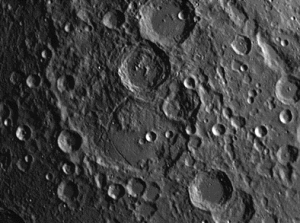The week of September 26 – October 2 takes us from Lunar Day 1 to Day 8. This week we will highlight the crater Janssen, viewable Thursday evening very close to the terminator, and Friday evening.
 Janssen: [SE/P13; L=40°E] Janssen is located 85 miles southwest of the Rheita Valley (which you may have observed last night). Janssen’s diameter is a robust 120 miles (Copernicus, the “Queen” of all craters, is a “mere” 58 miles in diameter!). Janssen is a textbook example of how new craters are superimposed on top of older craters and, at the same time, are smaller than the older craters that underlie them. Although Janssen is very old and its walls are in ruins, you should pay it a visit. When the Sun is low, it’s rather like visiting the ruins of an old castle; it’s still full of artifacts and reminders of a bygone age. The remains of the walls are still visible and there are mountains, rilles, and well-defined craters on its interior. The largest intruder is the crater Fabricius (48 mi.) that occupies the northern portion of the floor. The most impressive rille, Rima Janssen, is visible through very small telescopes.
Janssen: [SE/P13; L=40°E] Janssen is located 85 miles southwest of the Rheita Valley (which you may have observed last night). Janssen’s diameter is a robust 120 miles (Copernicus, the “Queen” of all craters, is a “mere” 58 miles in diameter!). Janssen is a textbook example of how new craters are superimposed on top of older craters and, at the same time, are smaller than the older craters that underlie them. Although Janssen is very old and its walls are in ruins, you should pay it a visit. When the Sun is low, it’s rather like visiting the ruins of an old castle; it’s still full of artifacts and reminders of a bygone age. The remains of the walls are still visible and there are mountains, rilles, and well-defined craters on its interior. The largest intruder is the crater Fabricius (48 mi.) that occupies the northern portion of the floor. The most impressive rille, Rima Janssen, is visible through very small telescopes.  It appears to be a graben that curves conspicuously from the southwest wall of Janssen and attaches to the south wall of Fabricius. It is unusual in that it is a highland rille. Janssen is a rewarding field to play in. Revisit it often!
It appears to be a graben that curves conspicuously from the southwest wall of Janssen and attaches to the south wall of Fabricius. It is unusual in that it is a highland rille. Janssen is a rewarding field to play in. Revisit it often!
OF ADDITIONAL INTEREST IN SPACE
On Monday, Jupiter is at opposition, and on Friday, the star Antares (“The Rival of Mars”) is 3° south of the Moon. At 11:00 p.m. on Friday, Mars will be just above the eastern horizon and you will be able to observe why it is called the rival of Mars.
======================
It is highly recommended that you get a copy of Sky and Telescope’s Field Map of the Moon, the very finest Moon map available for use at the telescope. It is available for $10.95 at www.skyandtelescope.com and on Amazon. All features mentioned in this blog will be keyed to the grid on the Field Map and will look like this: Plato: [NW/D9]
Credits:
Courtesy of Gray Photography of Corpus Christi, Texas
Lunar photos: NASA / USGS / BMDO / LROC / ASU / DLR / LOLA / Moon Globe. Used by permission
- Rupes Cauchy: A Best Known Fault on the Moon - July 22, 2024
- Moon Crater Schickard – Crater Floor has Stripes - July 15, 2024
- Moon Craters Langrenus and Vandelinus - July 8, 2024